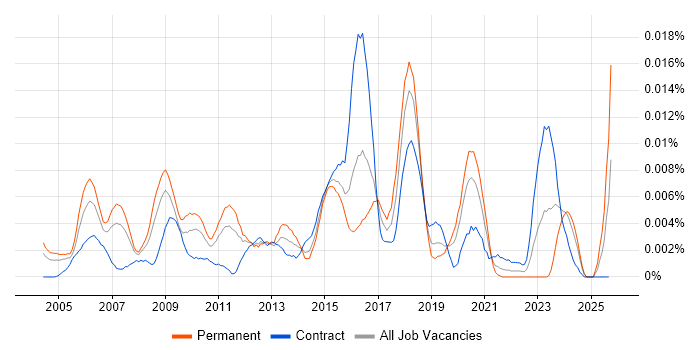Wireless Architect
UK
As of 19 October 2025, there is not enough information available from job vacancies posted within the last 6 months to determine the median Wireless Architect salary in the UK.
| 6 months to 19 Oct 2025 |
Same period 2024 | Same period 2023 | |
|---|---|---|---|
| Rank | 647 | - | - |
| Rank change year-on-year | - | - | - |
| Permanent jobs requiring a Wireless Architect | 1 | 0 | 0 |
| As % of all permanent jobs in the UK | 0.002% | - | - |
| As % of the Job Titles category | 0.002% | - | - |
| Number of salaries quoted | 0 | 0 | 0 |
| Median annual salary (50th Percentile) | - | - | - |
| UK excluding London median annual salary | - | - | - |
All Permanent IT Job Vacancies
UK
For comparison with the information above, the following table provides summary statistics for all permanent IT job vacancies. Most job vacancies include a discernible job title that can be normalized. As such, the figures in the second row provide an indication of the number of permanent jobs in our overall sample.
| Permanent vacancies in the UK with a recognized job title | 43,882 | 66,228 | 53,833 |
| % of permanent jobs with a recognized job title | 89.80% | 95.36% | 95.61% |
| Number of salaries quoted | 25,880 | 37,894 | 41,616 |
| 10th Percentile | £28,000 | £31,250 | £32,000 |
| 25th Percentile | £35,000 | £41,250 | £43,210 |
| Median annual salary (50th Percentile) | £52,500 | £56,000 | £60,000 |
| Median % change year-on-year | -6.25% | -6.67% | - |
| 75th Percentile | £73,750 | £75,000 | £80,000 |
| 90th Percentile | £93,750 | £95,000 | £97,500 |
| UK excluding London median annual salary | £45,000 | £50,000 | £52,500 |
| % change year-on-year | -10.00% | -4.76% | - |
Wireless Architect
Job Vacancy Trend
Historical trend showing the proportion of permanent IT job postings featuring 'Wireless Architect' in the job title relative to all permanent IT jobs advertised.

Wireless Architect
Salary Trend
Salary distribution trend for Wireless Architect job vacancies in the UK.

Wireless Architect
Top 4 Job Locations
The table below looks at the demand and provides a guide to the median salaries quoted in IT jobs citing Wireless Architect within the UK over the 6 months to 19 October 2025. The 'Rank Change' column provides an indication of the change in demand within each location based on the same 6 month period last year.
| Location | Rank Change on Same Period Last Year |
Matching Permanent IT Job Ads |
Median Salary Past 6 Months |
Median Salary % Change on Same Period Last Year |
Live Jobs |
|---|---|---|---|---|---|
| South East | - | 1 | - | - | 1 |
| England | - | 1 | - | - | 1 |
| Work from Home | - | 1 | - | - | 2 |
| UK excluding London | - | 1 | - | - | 1 |
Wireless Architect Skill Set
Top 14 Co-Occurring Skills & Capabilities
For the 6 months to 19 October 2025, Wireless Architect job roles required the following skills and capabilities in order of popularity. The figures indicate the absolute number of co-occurrences and as a proportion of all permanent job ads featuring Wireless Architect in the job title.
|
Wireless Architect Skill Set
Co-Occurring Skills & Capabilities by Category
The following tables expand on the one above by listing co-occurrences grouped by category. They cover the same employment type, locality and period, with up to 20 co-occurrences shown in each category:
|
|
|||||||||||||||||||||||||||
|
|
|||||||||||||||||||||||||||
|
|
|||||||||||||||||||||||||||
|
|
|||||||||||||||||||||||||||
